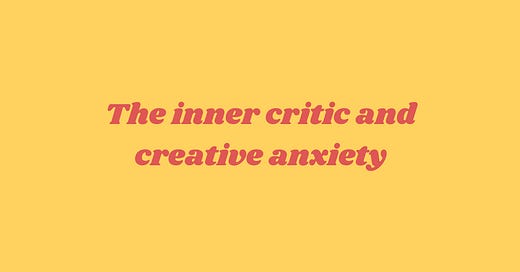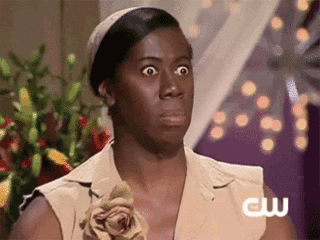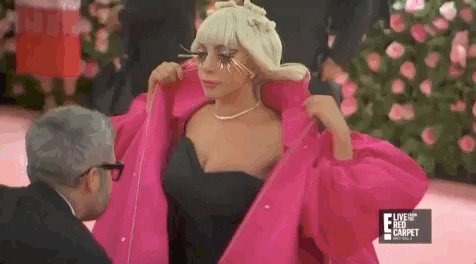How often do you have an amazing idea for a book/podcast/business/painting/cake, only procrastinate when it comes to actually doing it?
Or perhaps you do publish that blog, post that Tik Tok or knit that sweater…then as soon as it’s out in the big wide world, you hate it and instantly regret it.
These are examples of creative anxiety.
What is creative anxiety?
However you choose to channel and express it, creativity is an unpredictable, elusive thing. If you’re a creative by trade (for example, a writer, an artist or a designer), you’ll definitely relate to this. But the thing is, pretty much all of us are creative in some way.
Creativity is how you develop that strategy in your corporate job. It’s how you pick out the perfect vintage jacket or put together an outfit in the morning. It’s how you cook a meal for your loved ones.
In fact, creativity is what makes us human — whether it’s painting caves, storytelling or finding a way to make fire, we’ve been creative since the dawn of time.
But no matter how inherent it is to our lives, creativity can also produce a lot of anxiety. Creative anxiety usually comes from the fear of being judged, of not producing enough, of not performing, or of failing. When it shows up, it’s likely in the form of your inner critic.
How creative anxiety shows up
Everyone is different, but here are some of the telltale signs your inner critic might be affecting your creativity:
Self-judgment and worrying about what other people will think: The inner critic is our harshest judge, and usually has a lot to say about what other people think. So when you’re doing something creative, like writing, painting, or singing, your inner critic might criticise your ideas, skills, or originality.
Perfectionism and creative blocks: This depends on your TA drivers, but the inner critic tends to fuel perfectionism. If you feel like you need to produce flawless work, it can create a lot of pressure and anxiety that leads to creative blocks. The fear of making mistakes or producing something that falls short of the mark can stop you from exploring and experimenting with an idea.
Self-limiting beliefs and fear of taking risks: The inner critic often reinforces self-limiting beliefs about our creative abilities. It might tell you you’re not talented or original enough, meaning you underestimate your potential and avoid taking risks or being bold with your imagination.
Inner conflict and self-doubt: Your internal narrative isn’t just your inner critic — there are lots of forces and voices at play in your thought process. This is good in the sense that you can call on other voices (like your inner kindness) to counter your inner critic. However, it can also be exhausting when you feel like there’s a constant battle going on in your head, and this inner conflict might make you doubt yourself or compare yourself to others.
Negative self-talk and creative confidence: If your inner critic is throwing a lot of negative self-talk your way, it can impact your confidence and self-belief. Since it takes a lot of courage to express ourselves creatively, you might fall into imposter syndrome or even self-sabotage.
If you’re in this headspace, it can be really hard to get creative. Our inner critic can stifle ideas, stall our plans, inhibit our creative flow, and drum up a lot of fear about putting ourselves "out there”.
So what can you do about it?
How to overcome creative anxiety
Overcoming creative anxiety can be challenging, but the first step is to understand where it comes from. If you relate to any of the symptoms above, simply acknowledging that your inner critic is behind them can start to shift your mindset.
Wanna learn more about your inner critic? You’ve come to the right place. We’ve got plenty of resources and tips that will help you recognise, understand and manage your inner critic, so that you can take back some of its power.
On top of that, here’s some advice on how to work through creative anxiety:
Embrace the process: shift your focus from the end result to the process itself. What happens when you create purely for the sake of creating?
Set realistic expectations: try to remember mistakes and imperfections are part of every creative process. All of them are an opportunity for growth and improvement — or perhaps the mistakes become part of the art!
Bring some inner kindness to the table (or canvas, or computer screen): Pay attention to any negative self-talk that arises during the creative process. Have a go at challenging these with positive and affirming (or simply objectively true) statements. For example, “creativity is subjective” or “there are no right or wrong answers”.
Break it down: large creative projects can feel overwhelming. Play around with breaking down your creative tasks into smaller, manageable steps. When you tackle a project task-by-task, you might find you build momentum and confidence.
Create a supportive environment: surround yourself with a supportive and encouraging network. Share your creative journey with trusted friends, mentors, or fellow creatives who can provide constructive feedback and support. Having a supportive community can also help normalise creative anxiety — you’re definitely not alone.
Do things that relax you: it’s hard to feel creative if your body is in a state of stress. Try doing activities that activate your Parasympathetic Nervous System, like walking, yoga, meditating, or other hobbies that aren’t related to creativity. Taking care of your physical and mental wellbeing can not only help with anxiety, but you might also find that your best ideas come when you’re not trying (like when you’re in the shower).
Over to you
If you struggle with creative anxiety, how does it show up? What do you do to work through it? Tell us in the comments.
If you haven’t already, don’t forget to subscribe for weekly insights and tips that will help you get to know yourself and manage your inner critic.






